Vegan Globetrotter is supported by our audience. When you purchase through one of our links, we may earn a small affiliate commission. As an Amazon Associate I earn from qualifying purchases. Your cost is not affected.
==================
Pellet grills and gas grills are two popular options for outdoor cooking. A pellet grill, also known as a wood pellet grill, utilizes wood pellets as the fuel source to create heat and smoke for cooking. On the other hand, a gas grill relies on propane or natural gas to generate heat and create a direct flame for grilling. These two grills offer distinct cooking experiences, each with advantages and considerations.
Outdoor grilling has become increasingly popular, with individuals and families embracing the opportunity to cook and entertain in their backyards. Pellet grills have gained attention for their versatility in cooking methods, allowing users to grill, smoke, bake, and more. Wood pellets in pellet grills also add a smoky flavor to the food, providing a unique taste experience. On the other hand, gas grills offer quick heat-up times and precise temperature control, making them convenient for everyday grilling.
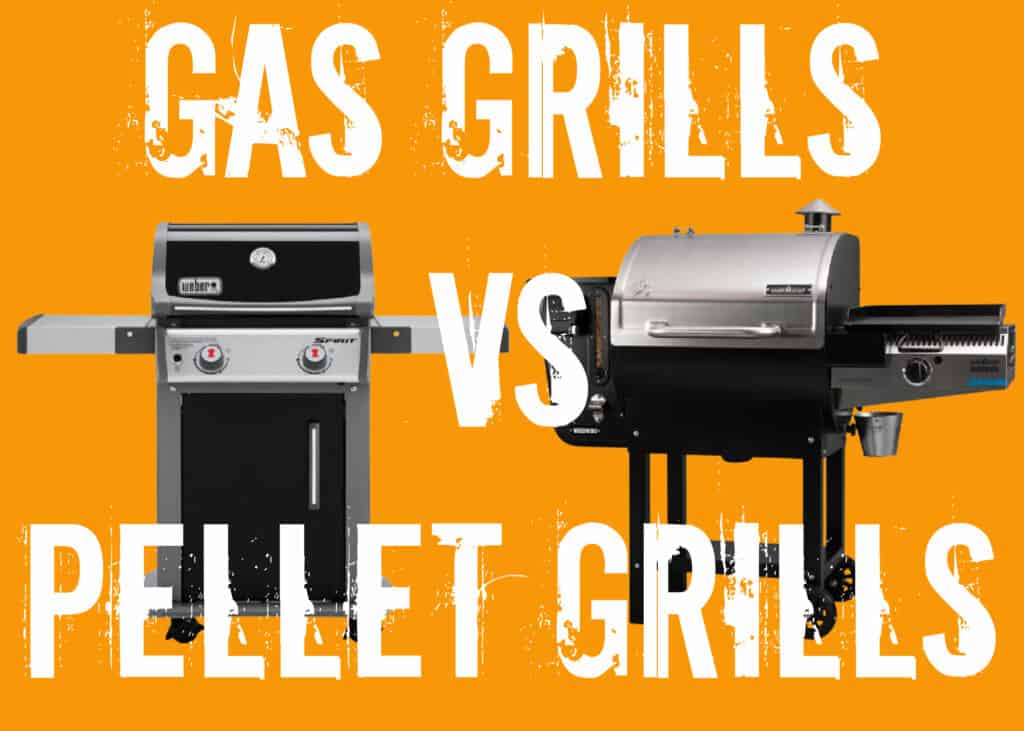
This blog compares and contrasts pellet and gas grills, highlighting their features, benefits, and drawbacks. By understanding the distinctions between these two types of grills, individuals can make an informed decision when choosing the right grill for their outdoor cooking needs. Whether it’s the versatility and smoky flavor of a pellet grill or the quick heating and convenience of a gas grill, this blog will provide valuable insights to help individuals make the best choice for their grilling preferences.
Pellet grills are outdoor cooking equipment that utilizes wood pellets as fuel to cook food. These grills work by feeding wood pellets into a fire pot, where an electric ignition ignites the pellets. The fire pot and a convection fan help distribute heat and smoke throughout the cooking chamber, ensuring even cooking and imparting a smoky flavor to the food.
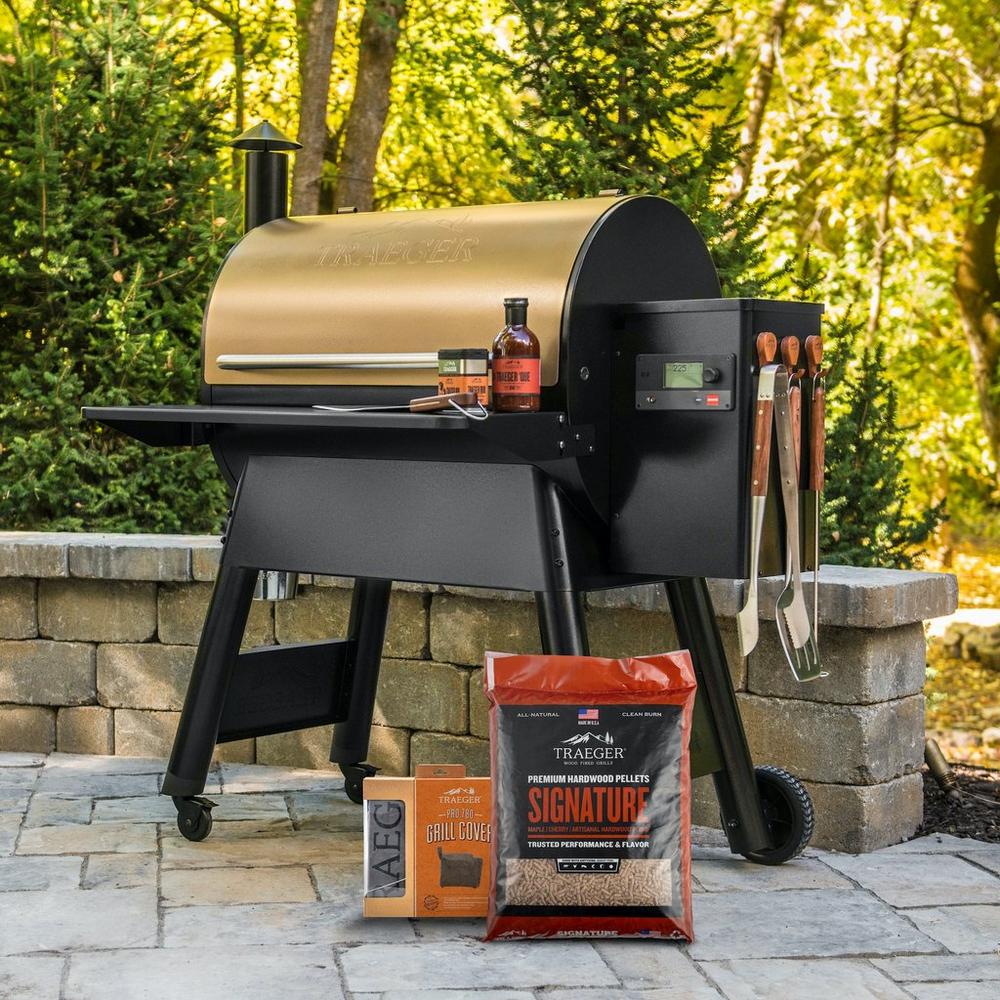
Pellet grills offer several advantages over other types of grills. They provide a versatile cooking experience, allowing for grilling, smoking, baking, and more. Users can easily adjust the heat with precise temperature control to achieve the desired cooking temperature. The automation features of pellet grills, such as temperature monitoring and pellet feeding, make them user-friendly and convenient.
Benefits of Pellet Grills
Pellet grills offer many benefits, making them a top choice for outdoor cooking enthusiasts. Here are the key advantages of using a pellet grill:
Achieve Versatility in Cooking Methods
Pellet grills are incredibly versatile, allowing you to cook various foods using different methods. Whether you want to grill steaks, smoke ribs, bake pizza, or roast a whole chicken, a pellet grill can handle everything. You can experiment with different cooking techniques and recipes with adjustable temperature settings.
Enjoy Enhanced Flavor from Wood Pellets
One of the pellet grills’ standout features is their enhanced flavor. Using wood pellets as fuel, the grill imparts a smoky taste to your food. You can choose from various wood pellet flavors such as hickory, mesquite, apple, or cherry, each offering a distinct aroma and taste. The natural wood-fired flavor elevates your grilling experience and adds depth to your dishes.
Benefit from Precise Temperature Control and Automation
Pellet grills come equipped with advanced temperature control systems that ensure precise cooking. These grills typically have digital control panels that allow you to set and maintain the desired cooking temperature accurately. Some models even offer Wi-Fi connectivity, enabling you to monitor and control the grill through a smartphone app remotely. The automation feature takes the guesswork out of cooking and ensures consistent results.
Experience Ease of Use and Beginner-Friendliness
Pellet grills are designed to be user-friendly, making them accessible even to beginners. Starting the grill is as simple as filling the hopper with wood pellets, setting the desired temperature, and letting the grill do the work. The automated pellet feed system maintains a steady fuel supply, so you don’t have to worry about constantly tending to the fire. The straightforward operation and intuitive controls make pellet grills popular for seasoned grillers and novices.
Drawbacks of Pellet Grills
Pellet grills have a few drawbacks that should be considered before purchasing. These include:
Higher Initial Cost
One downside of pellet grills is their higher initial cost than some gas grills. Pellet grills often come with more advanced features and technology, contributing to their higher price point. However, it’s important to consider the long-term benefits and versatility that a pellet grill can offer.
Dependency on Electricity
Another drawback of pellet grills is their dependency on electricity. Pellet grills require electricity to power the auger that feeds the wood pellets into the fire pot and operate the control panel and fans. This means that if you don’t have access to electricity or experience a power outage, you won’t be able to use your pellet grill.
Limited Portability
Pellet grills are generally larger and heavier than portable gas grills, making them less portable. While smaller pellet grill models are available, they still require a power source and may be more challenging to transport than gas grills. If you plan on frequently taking your grill on camping trips or tailgating, a gas grill may be more suitable.
Tips for Using a Pellet Grill Effectively
When it comes to grilling, a pellet grill offers unique advantages, such as enhanced flavor and precise temperature control. To make the most out of your pellet grilling experience, consider the following tips:
Choose the Right Wood Pellets
The type of wood pellets you use can significantly impact the flavor of your food. Experiment with flavors like hickory, mesquite, or applewood to find your preferred taste. Ensure that your wood pellets are high-quality and free from additives or fillers.
Clean and Maintain the Grill
Regular cleaning and maintenance are crucial for your pellet grill’s optimal performance and longevity. Occasionally, clean the grill grates, grease tray, and fire pot to prevent buildup and ensure consistent heat distribution. Refer to the manufacturer’s instructions for specific cleaning guidelines.
Monitor Temperature and Smoke Levels
One of the key advantages of pellet grills is their ability to maintain precise temperature control. Use the built-in temperature gauge or invest in a quality digital thermometer to accurately monitor your food’s internal temperature. Monitor the smoke levels, as excessive or insufficient smoke can affect the flavor.
Gas Grills
Gas grills signify a broad category of outdoor cooking equipment that utilizes propane or natural gas as heat sources. The functionality of most gas grills relies on a propane tank or a natural gas line. Upon ignition, the gas fuels the burners, creating flames that heat the grill grates. The cooking surface then transfers heat to cook food.
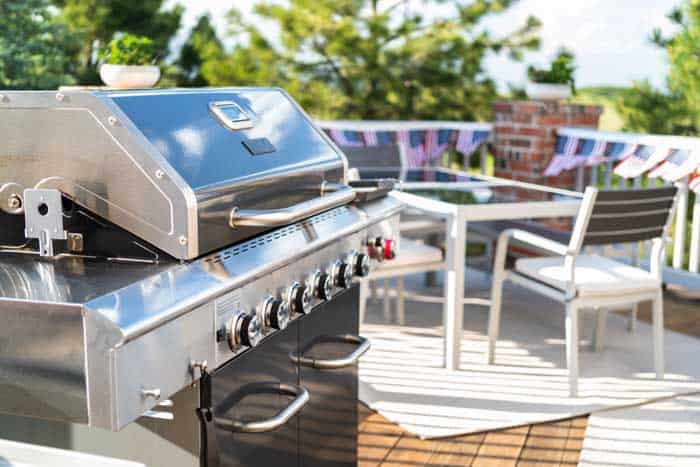
Benefits of Gas Grills
Gas grills have become a staple in outdoor cooking due to their convenience, efficiency, and versatility. Let’s delve deeper into the advantages of gas grills and discover why they are popular for those who enjoy cooking and entertaining outdoors.
Quick and Convenient Heat-Up Time
Gas grills are revered for their quick and convenient heat-up time. Unlike charcoal grills or wood pellet grills that require time for the charcoal briquettes or wood pellets to burn and reach the desired cooking temperature, gas grills can attain high temperatures almost instantly, accelerating the cooking process.
Wide Temperature Range for Different Cooking Styles
The wide temperature range offered by gas grills accommodates different cooking styles. Gas grills have it all: low and slow cooking for a smoky flavor or high-temperature grilling for a quick sear. While a pellet grill vs gas grill comparison would show that pellet grills also have a wide range, gas grills reach higher temperatures more quickly.
Easy Temperature Control
Temperature control in gas grills is more straightforward than in charcoal or pellet grills. With easily adjustable knobs, gas grills allow users to set the desired temperature, ensuring a precise cooking process. This control is less direct in a pellet grill, where wood pellets burn at a set rate, or in a charcoal grill, where adjusting the airflow controls temperature.
Portable Options Available
Many gas grills come in portable models, making them versatile for tailgating, camping, or other outdoor grilling events. Comparatively, pellet grills, especially wood pellets, are often heavier and less convenient to transport.
Drawbacks of Gas Grills
Gas grills have several drawbacks compared to charcoal or pellet grills. These limitations impact the flavor, versatility, and level of manual intervention required for certain cooking techniques.
Limited Smoky Flavor Compared to Charcoal or Pellets
One major drawback of gas grills is that they offer a little smoky flavor compared to charcoal or pellet grills. Gas grills use direct heat, which lacks the authentic smoky taste of charcoal or wood pellets. No real wood smoke can produce a less flavorful and aromatic cooking experience.
Less Versatile for Smoking or Low-Temperature Cooking
Gas grills are also less versatile regarding smoking or low-temperature cooking. While they excel at high-temperature grilling, they struggle to maintain consistent low temperatures required for slow cooking or smoking. Achieving the desired temperature range for these cooking methods can take time and effort on a gas grill, limiting the options for outdoor chefs.
More Manual Intervention Required for Smoking
When it comes to smoking, gas grills require more manual intervention compared to charcoal or pellet grills. Since gas grills lack the built-in smoke flavor, outdoor cooks must use smoker boxes or wood chips to infuse the food with smokiness. This additional step adds complexity to the cooking process and requires constant monitoring to ensure the wood chips continue to produce smoke.
Comparing Pellet Grills and Gas Grills
Regarding grilling, two popular options that often come to mind are pellet grills and gas grills. Both offer their own set of advantages and considerations. We will compare these two grilling options based on various factors to help you make an informed decision.
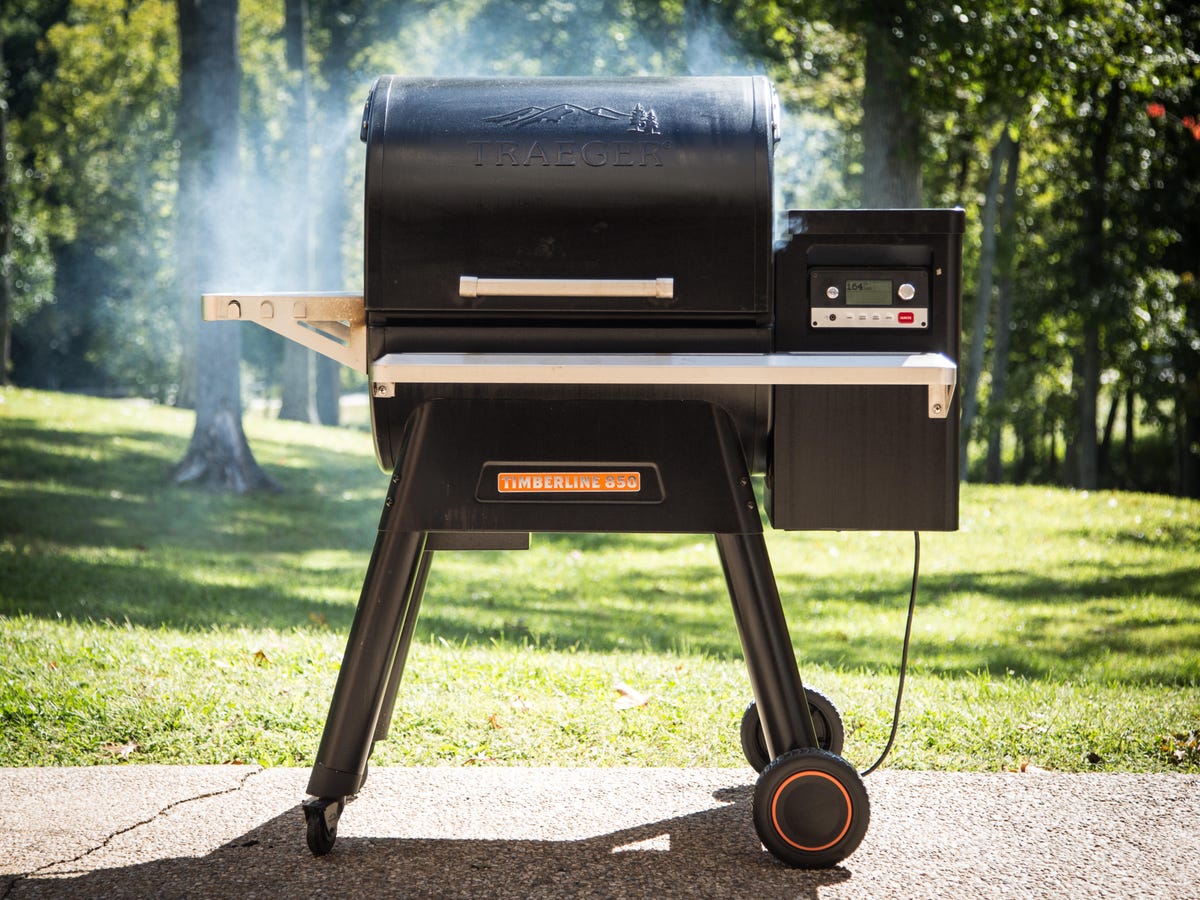
Cooking Versatility
Pellet grills and gas grills differ in terms of cooking versatility. Pellet grills are known for their ability to smoke, grill, bake, roast, and even braise. They provide various cooking options, allowing you to experiment with different flavors and techniques. On the other hand, gas grills primarily excel at direct grilling, making them ideal for quick cooking and searing.
Flavor Profile and Smoke Infusion
When it comes to flavor, pellet grills have the upper hand. They utilize wood pellets that add a distinct smoky flavor to the food. The type of wood pellets used can further enhance the taste, offering a variety of flavors to choose from. While they may offer some smoky flavor through smoker boxes or wood chips, gas grills cannot match the authentic smoky taste of pellet grills.
Temperature Control and Automation
Pellet grills are known for their precise temperature control and automation features. A digital controller lets you easily set and maintain the desired cooking temperature. Additionally, some pellet grills come with Wi-Fi connectivity, allowing you to monitor and control the grill remotely. Gas grills also offer temperature control but may require manual adjustments and monitoring.
Initial Cost and Ongoing Expenses
In terms of cost, gas grills are generally more affordable upfront compared to pellet grills. However, when considering ongoing expenses, such as fuel, pellets tend to be more cost-effective. Gas grills require propane tanks or natural gas, which can add to long-term expenses. Conversely, pellets provide efficient fuel consumption and can be less expensive, especially if purchased in bulk.
Portability and Ease of Use
Gas grills are often preferred for their portability and ease of use. They are typically designed with mobility in mind, making them suitable for camping trips, picnics, or tailgating. Gas grills are also relatively easy to operate, with convenient ignition systems and temperature controls. While less portable, pellet grills offer convenience with automated features and simple operation.
Maintenance and Cleaning Requirements
In terms of maintenance, both pellet grills and gas grills require regular cleaning and upkeep. Pellet grills need occasional ash removal from the fire pot and cleaning of the cooking grates. Gas grills require cleaning the burners, grill grates, and grease management systems. The specific cleaning requirements may vary between models, but overall, both types of grills demand routine maintenance to ensure optimal performance and longevity.
Personal Preference and Cooking Style Considerations
Ultimately, personal preference and cooking style are crucial in choosing between pellet and gas grills. If you value versatility, authentic smoky flavors, and the ability to experiment with various cooking techniques, a pellet grill may be the right choice. On the other hand, if you prefer quick and direct grilling, portability, and simplicity, a gas grill better suits your needs.
Both pellet grills and gas grills have their unique advantages and considerations. Understanding their differences in cooking versatility, flavor profile, temperature control, costs, portability, maintenance, and personal preferences will help you make an informed decision. Whether you opt for the rich smoky flavors of a pellet grill or the convenience of a gas grill, both options can offer an enjoyable outdoor cooking experience.
Choose the Right Grill for You
Are you ready to embark on your grilling journey? Finding the perfect grill that suits your needs and preferences is essential for culinary success. This guide will help you navigate the decision-making process, ensuring you select the grill that perfectly fits your requirements.
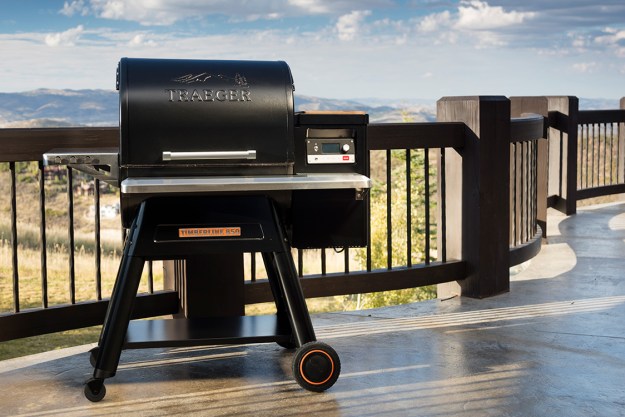
Assess Your Needs and Priorities
To make an informed decision, assessing your needs and priorities is crucial. Consider the following factors:
- Cooking Styles and Versatility: Determine the cooking styles you enjoy and how versatile you want your grill to be. Do you prefer slow and low cooking, high-temperature grilling, or both? This will help you determine which type of grill is best suited for your culinary aspirations.
- Available Space and Portability: Evaluate your space for your grill. If you have limited outdoor space or plan to take your grill on camping trips or tailgating events, portability becomes a significant factor in your decision-making process.
Consider Budget Constraints
Establishing a budget is essential when choosing a grill. Consider your financial limitations and find a balance between the features you desire and what you can afford. Remember, high-quality grills come at different prices, so you can find an option that fits your budget without compromising performance or durability.
Evaluate Available Space and Portability Requirements
Take a moment to evaluate the available space where your grill will reside. Measure the area and ensure that your chosen grill fits comfortably without overcrowding. If you plan to transport your grill frequently or require a compact option, prioritize portability features such as foldable legs or wheels.
Determine Desired Cooking Styles and Versatility
Decide on your desired cooking styles and the versatility you seek in a grill. Are you a fan of the traditional charcoal grilling experience, or do you prefer the convenience of a gas grill? Consider the pros and cons of each type, including factors such as heat retention, temperature control, and ease of use. You may also explore the option of pellet grills, which offer a unique combination of wood-fired flavor and versatility.
Gather Feedback and Research-Specific Models
Before finalizing your decision, gather feedback from friends, family, and online communities. Research specific grill models and read customer reviews to gain insights into their performance, durability, and customer satisfaction. This information will provide valuable guidance in selecting the right grill.
By following these steps, you’ll be well-equipped to make an informed decision and embark on a grilling adventure that perfectly suits you.
This video provides valuable insights comparing the Pellet Grill and Gas Grill, helping you decide on your grilling preferences.
Video Credit: @sixthisoverdrive
Choose Outdoor Cooking with Confidence: Exploring the Grill of Your Dreams
In the eternal debate of pellet grill vs. gas grill, it’s time to take control and make an informed decision. Take your time with the options. Instead, let the enjoyment of outdoor cooking guide you. Whether you opt for a gas grill or a wood pellet grill, the thrill of grilling awaits! Remember, the right grill is the one that suits your style and preferences. Don’t get caught up in the pellet grill vs. gas grill debate; instead, focus on finding the perfect match for your outdoor cooking needs. Whether you crave a pellet grill’s versatility or a gas grill’s convenience, both will elevate your grilling game.
So, get ready to embrace the thrill of outdoor cooking, igniting the flames of flavor and creating memorable meals. Regardless of your choice, the result will be a gastronomic delight that leaves your taste buds longing for more. Let the adventure begin with your chosen grill as the centerpiece of outdoor culinary excellence!
Frequently Asked Questions
What are the differences between a pellet grill and a gas grill?
A pellet and gas grill differ in fuel sources and cooking methods. A pellet grill uses wood pellets as fuel, providing a smoky flavor to the food, while a gas grill uses either propane or natural gas for heat. Pellet grills work by igniting the pellets in a fire pot, where they burn and produce heat and smoke, while gas grills rely on gas burners to generate heat.
Which grill offers better temperature control?
When it comes to temperature control, pellet grills have the upper hand. They feature precise temperature settings that allow you to consistently achieve and maintain your desired cooking temperature. Gas grills also offer temperature control but may not be as accurate as pellet grills, leading to potential temperature fluctuations.
Can I achieve a high heat sear on both types of grills?
While pellet grills excel at low and slow cooking, they may need help to achieve high heat searing compared to gas grills. Gas grills, especially those with infrared burners, provide high temperatures for a perfect sear on steaks and other meats. If searing is a priority for you, a gas grill might be a better choice.
Which grill is more versatile?
Both pellet grills and gas grills offer versatility in outdoor cooking. Thanks to their wood-fired flavor and convection cooking capabilities, pellet grills allow for smoking, baking, roasting, and grilling. On the other hand, gas grills offer a wide range of cooking options, from direct grilling to indirect cooking. Consider your specific cooking needs to determine which grill suits you best.
What about the initial cost and ongoing maintenance?
Regarding initial cost, gas grills are more affordable than pellet grills, which often come with additional features and technology. As for maintenance, pellet grills require regular cleaning of the fire pot and cooking grate and occasional ash removal. Gas grills generally have fewer maintenance requirements, although regular cleaning and checking of gas tanks are necessary.
Embark on a Plant-Based Adventure with Vegan Globetrotter!
Join Vegan Globetrotter on an incredible journey worldwide, discovering the most delectable plant-based cuisines and hidden vegan gems. Our mission is to inspire and empower individuals to embrace a compassionate and sustainable lifestyle while indulging in mouthwatering flavors from around the globe. Whether you’re a seasoned vegan, a curious foodie, or simply looking to expand your culinary horizons, Vegan Globetrotter is your ultimate guide to the exciting world of plant-based travel and gastronomy.
Connect with us on social media to stay updated on our latest adventures, tantalizing recipes, travel tips, and exclusive giveaways! Follow us on Facebook for vibrant food photos and engaging discussions, or find inspiration on Instagram as we capture the beauty of plant-based dishes from diverse cultures. Join our community on Pinterest to discover a treasure trove of plant-based recipes and travel inspiration, or follow us on Twitter for real-time updates and exciting news. Take advantage of the opportunity to explore the world through a vegan lens. Connect with Vegan Globetrotter today and embark on a flavorful, ethical, and unforgettable journey!
More Interesting Stuff!



Don't miss out
when new recipes and information are added!
Join our newsletter for free recipes,
healthy living inspiration, and special offers
You have Successfully Subscribed!